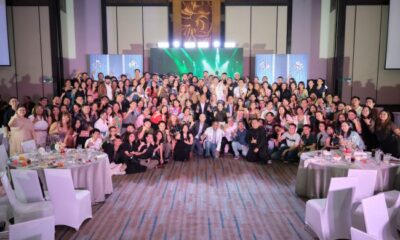Business
From Pittance to Billion in Assets: the Lamac Multi-Purpose Coop Story
Who would have thought that a small farmers group living in a remote mountain barangay in southwestern Cebu could roll a few thousand pesos as start-up capital to P1.7 billion in assets over 40 years later today.
This is the inspiring story of Lamac Multi-Purpose Cooperative, which began its humble beginnings in the town of Pinamungahan, 34 kilometers away from Cebu City or slightly over two hours’ drive by land.
A tale of faith, determination, unity and the spirit of volunteerism that began in 1973 by farmers who want nothing more than to provide their families with a full stomach.
Back in 1973, farming was the major source of livelihood in Lamac. But life was hard for poor farmers in the remote, jagged interior mountain barangay with no water, no electricity, and no road. Eating three meals a day with viand was even a luxury.
These farmers had to carry their produce on their backs and walked through rough trails to go to the town proper just to sell their harvests. The little earnings they gained were just sufficient to feed them. It was a life of hand-to-mouth existence.
These hardships impelled 70 tenant-tillers and small farm owners to join forces that same year and collaborate with each other on how to improve their living conditions. Their wish was simply to be able to feed their family three times a day and provide for other basic necessities in life such as putting their children to school.
After attending a government orientation on the essence of forming a farmers’ cooperative, they were convinced that the road to a better life rests on helping each other. Each of the 70 farmers then contributed P50 as seed capital for their new organization which they called Lamac Samahang Nayon Consumers Cooperative.
With a start-up capital of P3,500, the organization ventured into a consumer store to market their agricultural produce. Community members patronized their own store and nearby residents started to access it. Consumer and marketing services were their focus and the store generated profits while membership grew more than a hundred over the years.
But still, the trek from the farm-to-consumer store market remained tough as the mountain trail was steep in the absence of clear road paths. It was clearly too interior that paving a path road was not an immediate priority of the local government, with the tremendous budget it would entail versus the number of residents that could only benefit from it. Cebu, during those years, was still a struggling economy, and not as progressive as it is today.
In the spirit of community volunteerism, the farmer-members toiled together to blast an access road for easy transport by foot to bring their harvests to their market destination. But only after 11 long years was this made possible.
When rural electrification came in 1985, they heaved a sigh of relief. Water services were made available only in 1998, after more than 10 years and in between, residents had to fend for themselves getting natural water from the cool spring within the area.
But like any other organization, the coop faced several challenges hounded by issues on loose credit line system, absence of thorough bookkeeping and accounting services, financial mismanagemen, and non-continuing education for members. These affected payments for milling and marketing services.
The organization was on the brink of going downhill. Reflecting back on their purpose, the originators never gave up and instead worked back to its core values of unity, volunteerism, transparency and being God-fearing. They salvaged the organization with a change of management.
In 1992, the coop underwent a major change under a new management called BLOMES or the Barangay Lamac Officers and Management Effective System Incorporated. Along with it was also a change of name, which today is widely known as the Lamac Multi-Purpose Cooperative. In this same year, the organization was registered with the Cebu Development Authority (CDA) and became a full-fledged multi-purpose cooperative on March 13, 1992.
By then, all the members underwent a basic refresher seminar provided by the CDA-7 and instilled in each a bayanihan spirit that each is an owner. Members were taught that each has a responsibility to make the organization become better and help it grow more to benefit its increasing members.
Professionally managed and transparent in transactions open to scrutiny, the cooperative performed better and reaping healthy returns of profit as they slowly embark on other business undertakings.
From an average multi-purpose consumer store, the coop ventured into food products like fresh carabao milk drinks from its own carabaos, cassava cakes and ice cream using pure carabao milk, sardines using coco water with tomato sauce and carabao milk. It also went into organic farming producing vegetable varieties like lettuce, eggplants, spring onions, beans and chayote. Today, its lettuce is being used by a popular chain of food stores while different hotels buy their other vegetable produce.
With tracts of land also focused on coconut farming, the cooperative also manufactured coco sugar and managed a coco ice water plant, which their fishermen-members used to ensure the freshness of their daily fish catch.
Knowing the rising market demand for cocoa, the coop did not let this lucrative venture pass and had 500 hectares of land planted with high breed cacao seedlings. This time, it expanded to other parts of the Visayas, as only 180 hectares of cacao plantation is housed in Cebu.
Homemade beauty soaps with carabao milk ingredient, laundry bars, and dishwashing liquid are now manufactured and packaged for distribution. Another neophyte project is the massive T-shirt printing services manned by youth-members.
All their food and non-food products are sold in 33 outlets all over the Visayas. As profits raked in, the management decided to scale up their investments as the cooperative put up its own bank and dormitory and the grandest of all is the Hidden Valley Wave Pool and Mountain Resort right in its own backyard – in Lamac.
The bank is largely established to provide education loans to its members who might need immediate cash for their children’s college needs. And as tertiary education is concentrated in Cebu City, the cooperative built its own dormitory for its members’ children who are in the city to finish their education. It also serves as transient lodging for members from other provinces that come to Cebu for various purposes.
A popular getaway for those who want to relax and explore the scenic spots within the area, the mountain resort offers tourists enchanting water springs, mountain trekking, wave pool and infinity pool. Children just love to try the exciting sky cycle ride or biking in midair. Nearby is its organic farm where vegetable picking and selling are done.
The resort also offers convention packages and adequate accommodation for families, friends or for companies.
Since shelter is a basic need, the management gave priority to its housing program where today, almost 600 families near the resort no longer squat but own their own lot while 55 units in a local subdivision worth P670,000 each have been taken by members on easy installment plan.
Over 500 members have been given direct employment while 3,000 more have benefitted from temporary work such as in construction.
Anytime this year, the cooperative will launch its own sustainable organic farm tourism with four hectares of land devoted to the project. Also in Lamac, the concept is for a member-family to own a 500-square meter lot of which 37 square meters will be the house size and the remaining land will be for vegetable gardening, milking carabao, and other livestock.
Among the regional government agencies that provided technical assistance include the Cooperative Development Authority, Department of Trade and Industry, Technical Education and Skills Development Authority, and the Department of Tourism.
From a meager capital of P3,500, the cooperative was able to turn this to P1.7 billion in over 40 years.
“We credit our success to our spirit of volunteerism, unity and faith in God,” said Ellen Limocon, general manager of the Lamac Cooperative, adding “we always look back and never forget where we came from.”
Of the over 100,000 members as of 2018, Limocon said 66 percent are still farmers with an adequate number of fishermen, too.
This year, Limocon said they intend to open more outlets in Cebu and other provinces in the Visayas.
According to Limocon, they aim to grow more and improve the lives of members who are mostly from the marginalized sectors. In fact, some board of directors are professionals who opted to also serve in the cooperative to pay back the opportunity given for their education.
Despite their early struggles, the originators of the cooperative never gave up and pursued their goals, while their story hopes to inspire other cooperatives that want to build a better future for its members.
Because of their inspiring story and the continuing initiatives to grow and excel, the Lamac Multi-Purpose Cooperative was given recognition by the CDA as “Gawad Parangal” Billionaire Awardee three times back in 2015, 2017 and 2018. This earned them the CDA’s Hall of Fame distinction. (fcr/PIA7)
































